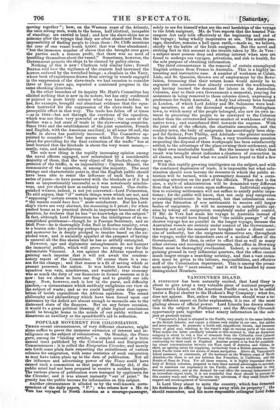POPULAR MOVEMENT FOR COLONIZATION.
THREE recent circumstances, of very different character, might alone suffice to prove the immense extension of interest and in- telligence on the subject of colonization. On Monday, the Times gave among its "leading articles," a simple account of a little annual tract published by the Colonial Land and Emigration Commissioners : it is called the Emigration Circular, and merely sets forth some plain facts respecting the suitableness of various colonies for emigration, with some statistics of such emigration as may have taken place up to the date of publication. Not all the influence and advertising power of the Times could have caused such a commotion as that paper of Monday did, if the public mind had not been prepared to receive a sudden impulse. The various places of publication were besieged by applicants for the Circular, and it was almost instantly out of print." So greedy has the public become for information on this subject. Another circumstance is alluded to by the well-known cone- vondent of the daily papers, " P." ; who relates how a Mr. de Vera has voyaged to North America as a steerage-paasenger,
solely to see for himself what are the real hardships of the voyage to the Irish emigrant. Mr. de Vere reports that the boasted Pas- sengers Act only tells effectively at the beginning and end of the voyage; • being wholly inoperative at sea. The middle pas- sage, therefore, remains a hell upon earth,—made so, we believe, chiefly by the habits of the Irish emigrant. But the novel and striking fact in this account is the trouble taken by Mr. de Vere : a subject must possess deep and stirring interest when men are found to undergo sea voyages, privations, and risk to health, for the sole purpose of obtaining information.
The third circumstance is the removal of certain unemployed English artisans from France to Australia. This is a highly in- teresting and instructive case. A number of workmen at Calais, Lisle, and St. Quentin, thrown out of employment by the Revo- lution, foreseeing that their return home would merely be to augment the numbers that already overcrowd the workhouses, and having learned the demand for labour in the Australian Colonies, sent to their own Government a memorial, praying for assistance in being removed to those colonies direct, expressing a preference for South Australia. A body had already been formed in London of which Lord Ashley and Mr. Salomons were lead- ing members, to aid the distressed workpeople. Nottingham town, to which many of the people belonged, also saw its own in- terest in procuring the people to be conveyed to the Colonies rather than the overcrowded labour-market or workhouse of their native town; - and contributed 600/. towards the expense. With the joint aid of the officials, the charitable association, and the country town, the body of emigrants has accordingly been ship- ped for Sydney, Port Phillip, and Adelaide—the greater number to the South Australian port. Thus, a very troublesome question respectin,, the disposal of these workpeople has been satisfactorily,
settled, to advantage of the place owning their settlement, and to their own incalculable benefit. But the manner in which that result was brought about indicates a clearness of conception in all classes, much beyond what we could have hoped to find a few years ago. With this rapidly growing intelligence on the subject, and with the continued depression of trade, it is impossible but what colo- nization should soon become the resource to which the public at- tention will be turned, with a peremptory demand for a corre- sponding attention on the part of the officials. When that is the case, a style of administration will be demanded very different from that which now exists upon sufferance. Individual emigre.- tion to existing settlements will not suffice to satisfy public impa- tience; for the public will know, that not only may emigration to existing settlements be increased, but that colonization com- prises the formation of new settlements to receive still larger bodies of emigrants. It will be necessary to satisfy public opi- nion by taking all emigration completely under public control. If Mr. de Vere had made his voyage to Australia instead of Canada, he would have found that "the middle passage" of the shorter voyage has no parallel in the longer voyage, because the Australian vessels are entirely under control of the Government; whereby not only the masters are brought under a direct exer- cise of authority, but the emigrants themselves are, throughout the voyage, under the immediate care of a medical officer of the Government. But then, in order to effect that as well as many other obvious and necessary improvements, the office in Downing Street must be thoroughly overhauled. Indeed, a conviction is gaining ground in very influential quarters, that the office cannot much longer escape a searching scrutiny, and that a vast exten- sion must be given to the labours, responsibilities, and effective staff of the Colonization department. This is among the promi- nent subjects for " next session," and it will be handled by some distinguished Members.


























 Previous page
Previous page